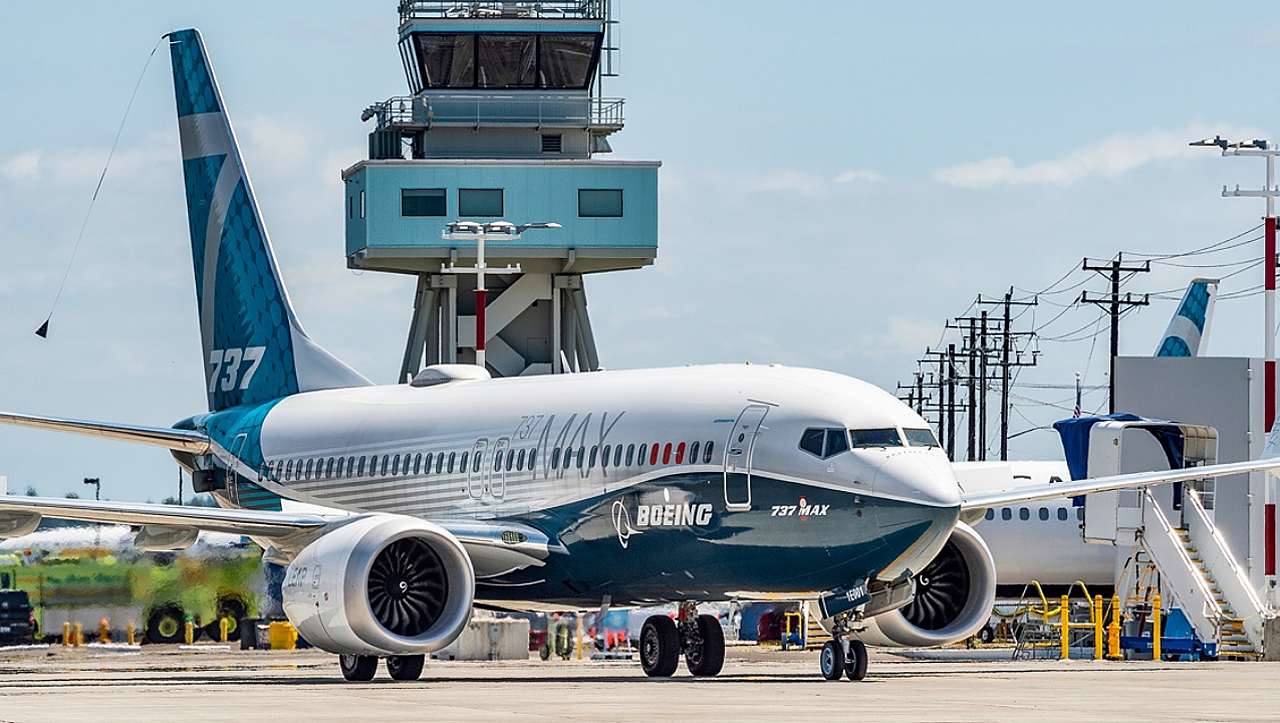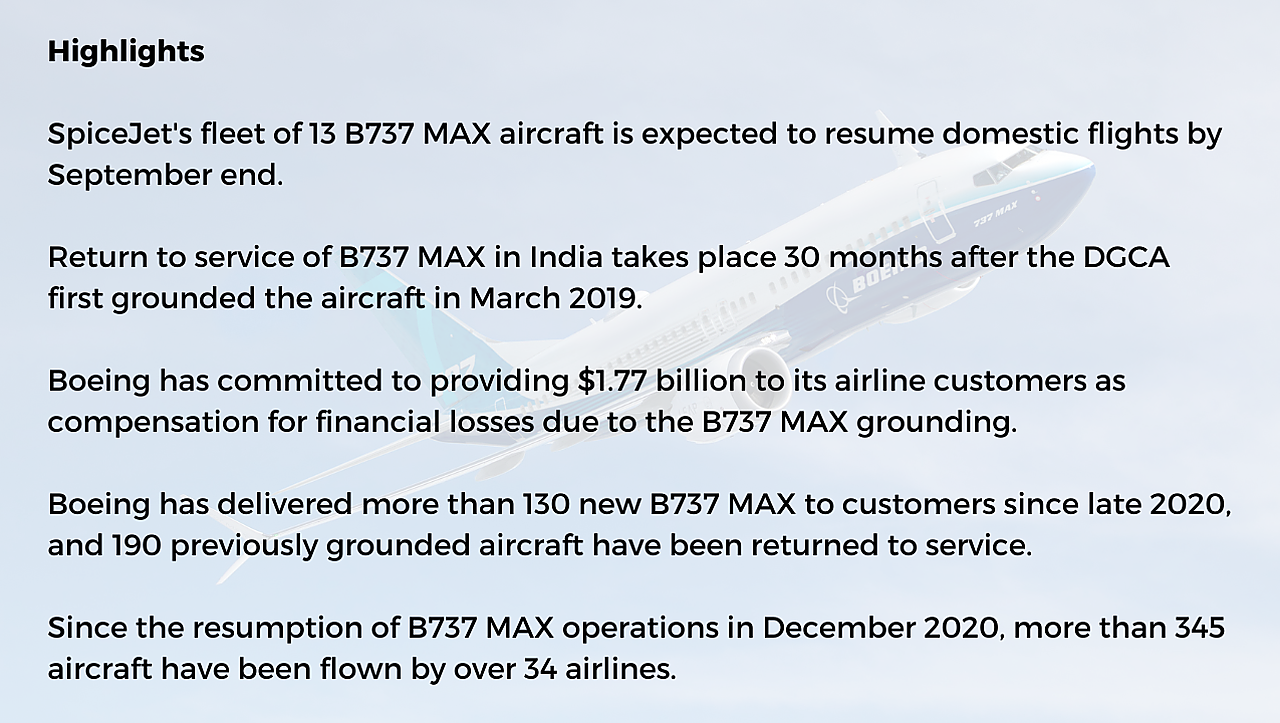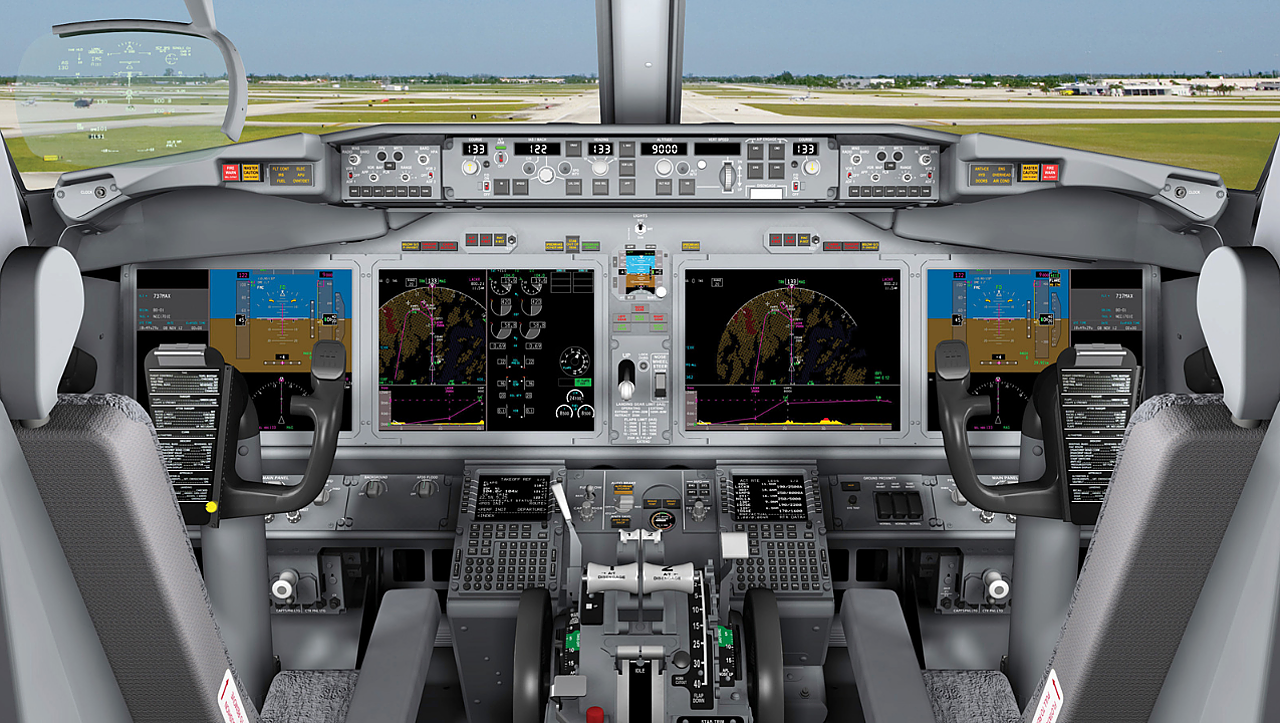
Boeing is nearing the end of the most trying period in its storied 105-year history, with the gradual resumption of B737 MAX flight operations over the course of this year. India and Malaysia are two of the latest nations to approve resumption of flight operations with the new-generation single-aisle jetliner.
Low-Cost Carrier (LCC) SpiceJet is the only B737 MAX operator in India, and its fleet of 13 aircraft are expected to resume commercial service on domestic routes by the end of this month. SpiceJet has placed firm orders with Boeing for 155 MAX 8, 9 and 10s and purchase rights for 50 more aircraft.
Approval for flight
The Directorate General of Civil Aviation (DGCA), India's civil aviation regulator, approved the resumption of B737 MAX commercial operations in Indian airspace last month. This will allow SpiceJet to resume operations with the type in India, 30 months after the DGCA first grounded the aircraft in March 2019. The new and technologically advanced 737 aircraft ever built, B737 MAX, were grounded globally in 2019, following two fatal crashes involving Lion Air Flight 610 and Ethiopian Airlines Flight 302, resulting in the loss of 346 lives.
The US Federal Aviation Administration (FAA) paved the way for the B737 MAX's return to service in the USA in November 2020 with an Airworthiness Directive (AD) that mandated the required actions for its Return To Service (RTS).

The European Aviation Safety Agency (EASA) approved the resumption of B737 MAX flights in Europe with an AD issued in February, and this was also mandated by DGCA for compliance on Indian registered B737 MAX aircraft, superseding its original March 2019 order.
The DGCA's April notification allowed commencement of operational readiness flights for foreign registered B737 MAX aircraft in India and preparations for their ferry flights out of India. It also allowed overflights over Indian airspace by foreign-registered B737 MAX airplanes. The April notification allowed foreign aircraft lessors to undertake RTS - remote tower service actions on their aircraft in India, followed by an operational readiness flight as mandated by FAA and EASA EDS, before ferrying the aircraft out of India.
Flight towards closure
The 737 MAX saga has been particularly painful for Boeing, which was locked in an intense battle with European airframer Airbus in a battle for single-aisle supremacy against the A320 family. Following the fatal Lion Air and Ethiopian Airlines crashes, the US Department of Justice (DOJ) began an investigation into the company relating to the FAA's evaluation of 737 MAX airplanes. Boeing eventually agreed with the DOJ in January to resolve the investigation.
Under the terms of the agreement, Boeing will pay a penalty of $243.6 million, along with $500 million in additional compensation to the families of the victims in the Lion Air and Ethiopian Airlines accidents. The airframer has also committed to providing $1.77 billion to its airline customers as part of its ongoing efforts to compensate them for financial losses resulting from the grounding of these aircraft.
As part of the resolution agreement, the DOJ will defer prosecution of Boeing, under a three-year deferred prosecution agreement, with charges to be dismissed at the end of that period if Boeing abides by the agreement's obligations.
The airframer has also incorporated the recommendations provided by multiple committees to investigate the two airlines crashes and incorporated the results from its internal reviews to improve its overall design process. According to the company, its revised 737 MAX design has undergone intensive internal and regulatory scrutiny and reviews with over 375,000 engineering and test hours and 1,300 test flights.

Return to normalcy
Since the FAA's decision in November to allow resumption of B737 operations, Boeing has delivered more than 130 new aircraft to airline customers and aircraft lessors. The resumption of B737 MAX deliveries is a shot in the arm for the airframer, which has built more than 800 MAX aircraft and delivered just over half of them, with the rest in storage.
Airline operators have also returned approximately 190 previously grounded MAX jetliners to service, safely flying about 95,000 revenue flights totalling more than 218,000 flight hours (as of July 25, 2021). Since the resumption of B737 MAX operations worldwide last December, more than 345 aircraft have been flown by over 34 airlines, completing 1,22,824 total departures with 2,89,537 cumulative hours (as of late August).
Addressing the employees on July 28, following the company's second-quarter results, Dave Calhoun, President, Boeing, said the company made significant progress on 737 MAX with new orders, increased production and higher deliveries, and diligently supported the safe return to service of the growing operational fleet. 'We were also encouraged to see commercial customers make long-term investments and reinforce confidence in the 737 MAX through more than 280 gross orders this quarter,' he added.
Boeing has an order backlog for 3,334 B737 MAX family jetliners and is presently maintaining a production rate of about 16 aircraft per month, with plans to increase this to 31 by early 2022. It hopes to increase based on market demand gradually. Boeing's commercial airplanes orderbook backlog at the end of July included over 4,100 airplanes valued at $ 285 billion.
Photos courtesy: Boeing.